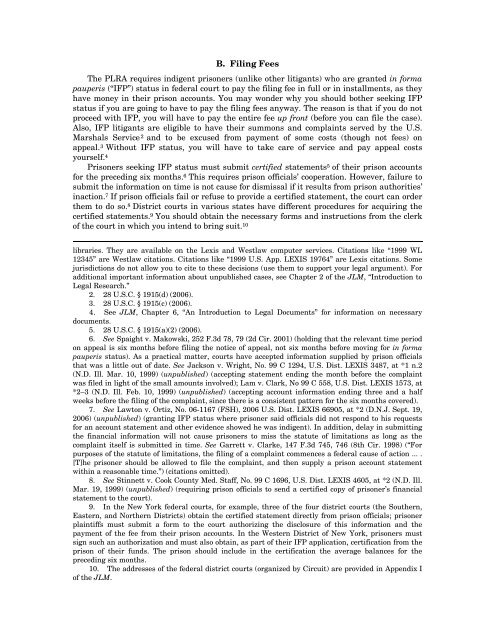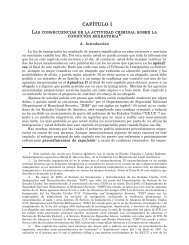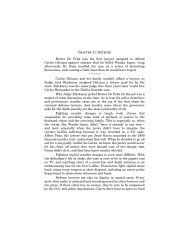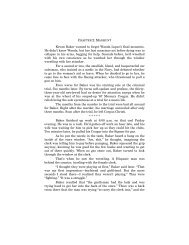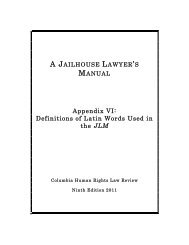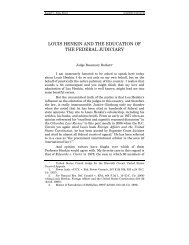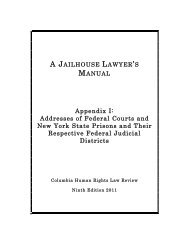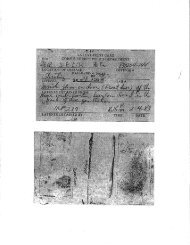A Jailhouse Lawyer's Manual Chapter 14 - Columbia Law School
A Jailhouse Lawyer's Manual Chapter 14 - Columbia Law School
A Jailhouse Lawyer's Manual Chapter 14 - Columbia Law School
You also want an ePaper? Increase the reach of your titles
YUMPU automatically turns print PDFs into web optimized ePapers that Google loves.
B. Filing Fees<br />
The PLRA requires indigent prisoners (unlike other litigants) who are granted in forma<br />
pauperis (“IFP”) status in federal court to pay the filing fee in full or in installments, as they<br />
have money in their prison accounts. You may wonder why you should bother seeking IFP<br />
status if you are going to have to pay the filing fees anyway. The reason is that if you do not<br />
proceed with IFP, you will have to pay the entire fee up front (before you can file the case).<br />
Also, IFP litigants are eligible to have their summons and complaints served by the U.S.<br />
Marshals Service 2 and to be excused from payment of some costs (though not fees) on<br />
appeal. 3 Without IFP status, you will have to take care of service and pay appeal costs<br />
yourself. 4<br />
Prisoners seeking IFP status must submit certified statements 5 of their prison accounts<br />
for the preceding six months. 6 This requires prison officials’ cooperation. However, failure to<br />
submit the information on time is not cause for dismissal if it results from prison authorities’<br />
inaction. 7 If prison officials fail or refuse to provide a certified statement, the court can order<br />
them to do so. 8 District courts in various states have different procedures for acquiring the<br />
certified statements. 9 You should obtain the necessary forms and instructions from the clerk<br />
of the court in which you intend to bring suit. 10<br />
libraries. They are available on the Lexis and Westlaw computer services. Citations like “1999 WL<br />
12345” are Westlaw citations. Citations like “1999 U.S. App. LEXIS 19764” are Lexis citations. Some<br />
jurisdictions do not allow you to cite to these decisions (use them to support your legal argument). For<br />
additional important information about unpublished cases, see <strong>Chapter</strong> 2 of the JLM, “Introduction to<br />
Legal Research.”<br />
2. 28 U.S.C. § 1915(d) (2006).<br />
3. 28 U.S.C. § 1915(c) (2006).<br />
4. See JLM, <strong>Chapter</strong> 6, “An Introduction to Legal Documents” for information on necessary<br />
documents.<br />
5. 28 U.S.C. § 1915(a)(2) (2006).<br />
6. See Spaight v. Makowski, 252 F.3d 78, 79 (2d Cir. 2001) (holding that the relevant time period<br />
on appeal is six months before filing the notice of appeal, not six months before moving for in forma<br />
pauperis status). As a practical matter, courts have accepted information supplied by prison officials<br />
that was a little out of date. See Jackson v. Wright, No. 99 C 1294, U.S. Dist. LEXIS 3487, at *1 n.2<br />
(N.D. Ill. Mar. 10, 1999) (unpublished) (accepting statement ending the month before the complaint<br />
was filed in light of the small amounts involved); Lam v. Clark, No 99 C 558, U.S. Dist. LEXIS 1573, at<br />
*2–3 (N.D. Ill. Feb. 10, 1999) (unpublished) (accepting account information ending three and a half<br />
weeks before the filing of the complaint, since there is a consistent pattern for the six months covered).<br />
7. See <strong>Law</strong>ton v. Ortiz, No. 06-1167 (FSH), 2006 U.S. Dist. LEXIS 66905, at *2 (D.N.J. Sept. 19,<br />
2006) (unpublished) (granting IFP status where prisoner said officials did not respond to his requests<br />
for an account statement and other evidence showed he was indigent). In addition, delay in submitting<br />
the financial information will not cause prisoners to miss the statute of limitations as long as the<br />
complaint itself is submitted in time. See Garrett v. Clarke, <strong>14</strong>7 F.3d 745, 746 (8th Cir. 1998) (“For<br />
purposes of the statute of limitations, the filing of a complaint commences a federal cause of action ... .<br />
[T]he prisoner should be allowed to file the complaint, and then supply a prison account statement<br />
within a reasonable time.”) (citations omitted).<br />
8. See Stinnett v. Cook County Med. Staff, No. 99 C 1696, U.S. Dist. LEXIS 4605, at *2 (N.D. Ill.<br />
Mar. 19, 1999) (unpublished) (requiring prison officials to send a certified copy of prisoner’s financial<br />
statement to the court).<br />
9. In the New York federal courts, for example, three of the four district courts (the Southern,<br />
Eastern, and Northern Districts) obtain the certified statement directly from prison officials; prisoner<br />
plaintiffs must submit a form to the court authorizing the disclosure of this information and the<br />
payment of the fee from their prison accounts. In the Western District of New York, prisoners must<br />
sign such an authorization and must also obtain, as part of their IFP application, certification from the<br />
prison of their funds. The prison should include in the certification the average balances for the<br />
preceding six months.<br />
10. The addresses of the federal district courts (organized by Circuit) are provided in Appendix I<br />
of the JLM.


